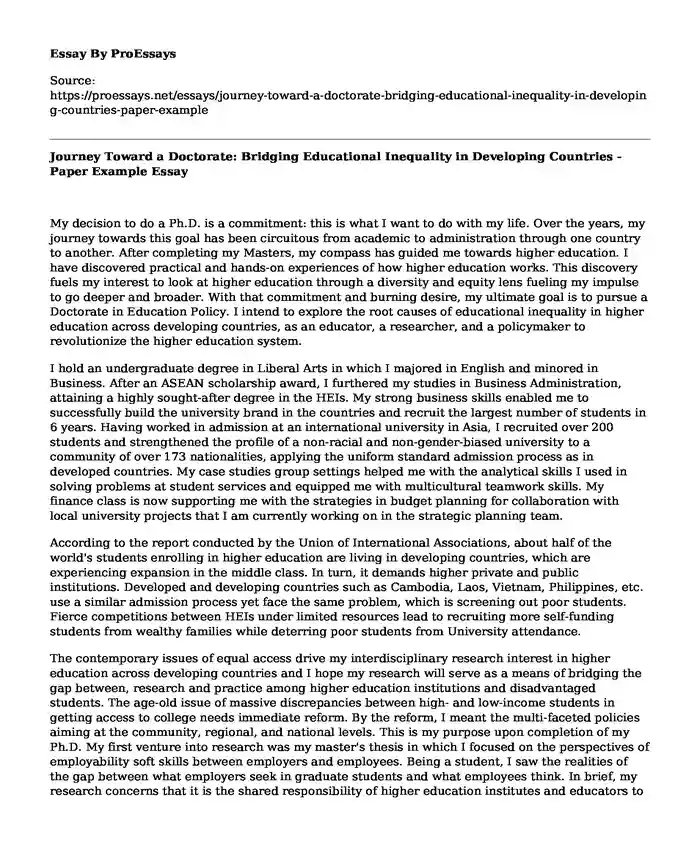My decision to do a Ph.D. is a commitment: this is what I want to do with my life. Over the years, my journey towards this goal has been circuitous from academic to administration through one country to another. After completing my Masters, my compass has guided me towards higher education. I have discovered practical and hands-on experiences of how higher education works. This discovery fuels my interest to look at higher education through a diversity and equity lens fueling my impulse to go deeper and broader. With that commitment and burning desire, my ultimate goal is to pursue a Doctorate in Education Policy. I intend to explore the root causes of educational inequality in higher education across developing countries, as an educator, a researcher, and a policymaker to revolutionize the higher education system.
I hold an undergraduate degree in Liberal Arts in which I majored in English and minored in Business. After an ASEAN scholarship award, I furthered my studies in Business Administration, attaining a highly sought-after degree in the HEIs. My strong business skills enabled me to successfully build the university brand in the countries and recruit the largest number of students in 6 years. Having worked in admission at an international university in Asia, I recruited over 200 students and strengthened the profile of a non-racial and non-gender-biased university to a community of over 173 nationalities, applying the uniform standard admission process as in developed countries. My case studies group settings helped me with the analytical skills I used in solving problems at student services and equipped me with multicultural teamwork skills. My finance class is now supporting me with the strategies in budget planning for collaboration with local university projects that I am currently working on in the strategic planning team.
According to the report conducted by the Union of International Associations, about half of the world's students enrolling in higher education are living in developing countries, which are experiencing expansion in the middle class. In turn, it demands higher private and public institutions. Developed and developing countries such as Cambodia, Laos, Vietnam, Philippines, etc. use a similar admission process yet face the same problem, which is screening out poor students. Fierce competitions between HEIs under limited resources lead to recruiting more self-funding students from wealthy families while deterring poor students from University attendance.
The contemporary issues of equal access drive my interdisciplinary research interest in higher education across developing countries and I hope my research will serve as a means of bridging the gap between, research and practice among higher education institutions and disadvantaged students. The age-old issue of massive discrepancies between high- and low-income students in getting access to college needs immediate reform. By the reform, I meant the multi-faceted policies aiming at the community, regional, and national levels. This is my purpose upon completion of my Ph.D. My first venture into research was my master's thesis in which I focused on the perspectives of employability soft skills between employers and employees. Being a student, I saw the realities of the gap between what employers seek in graduate students and what employees think. In brief, my research concerns that it is the shared responsibility of higher education institutes and educators to prepare graduates for careers through skill development.
Through sources I encountered during my research and work experiences, I came across possible solutions for financing for college; they challenged my basic understanding of access to higher education. The books ranged from the bestselling breakthrough book, The Element by Ken Robinson, The Price of Admission by Daniel Golden, The Theoretical Framework of Higher Education Demand Index (HEDI) from Demographics, and The Demand for Higher Education by Nathan D. Grawe, and Paying the Price by Sara Goldrick-Rab. My penchant for higher education stems largely from, and I wholeheartedly want to focus my interdisciplinary research on equality and diversity in higher education.
What draws me towards USC Rossier is not only the fact that it ranks at eleventh place for best schools in education, but its faculty members’ scholarly works have great influences on educational policy and practice. I feel that my life experiences as well as my commitment to education would be an asset to Rossier’s doctoral program in Urban Education Policy. To me, education is an ecosystem centered on students, institutions, and teachers. Policymakers and leaders need to re-think policies as engines that fuel the ecosystem and start a revolution to reform and develop systems based on diversity, equality, and collaboration. Diversity means not only race and gender; it includes poor, rural, and minority students, the other end of the spectrum of socioeconomic diversity. I am convinced that I can start fulfilling my capacity at a premier institution like the University of Southern California.
Cite this page
Journey Toward a Doctorate: Bridging Educational Inequality in Developing Countries - Paper Example. (2023, Dec 31). Retrieved from https://proessays.net/essays/journey-toward-a-doctorate-bridging-educational-inequality-in-developing-countries-paper-example
If you are the original author of this essay and no longer wish to have it published on the ProEssays website, please click below to request its removal:
- The Perspective of Undergraduate Students as It Relates to Workplace Bullying
- Reflection of the Twelve Weeks Learning Process - Essay Sample
- Evaluation Trump`s Presidency - Essay Sample
- The Economic Plight of the Afghans in Australia Reflection Essay Example
- Essay Sample on Child Labor
- Essay Example on Overcoming Stage Fright: Learning the Art of Public Speaking
- Essay Example on Uniforms in Public Schools: The Growing Prevalence







